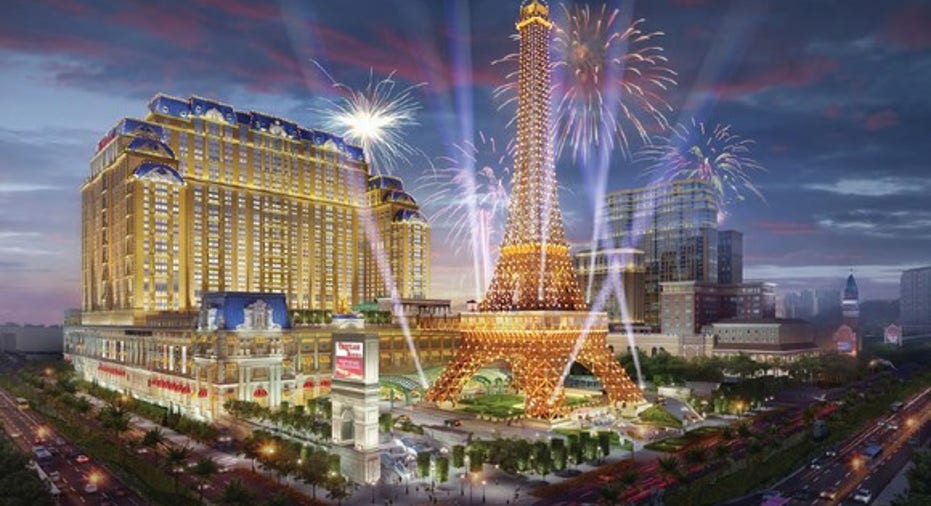New Mega Resorts in Macau: Why Studio City's Terrible Results Don't Matter

Wynn Palace, which recently opened in Macau, hopes to avoid Studio City's slow start. Image source: Wynn Resorts.
Not all resorts or casinos are created equal. Walk up and down the Las Vegas Strip and you'll see extravagant resorts that generate billions in revenue each year and run down casinos that are literally in bankruptcy.
The same can be said in Macau, which is why we can't draw too many conclusions from struggles at Melco Crown's (NASDAQ: MPEL) Studio City. The resort is reportedly close to defaulting on a $1.4 billion loan, which fellow Fool Rich Duprey said spelled trouble for new properties from Las Vegas Sands (NYSE: LVS) and Wynn Resorts (NASDAQ: WYNN). But a close look at the numbers tells a different story.
Studio City is a unique property in Macau
When it was first proposed, Studio City wasn't going to be a casino at all -- it wasn't even owned by a company with a gaming concession. When Melco Crown bought a 60% stake in the project, plans changed: CEO Lawrence Ho was confident he could get as many as 400 table games at the project, making the $2 billion price tag a decent bet.
But Oaktree Capital Management LP and Silver Point Capital LP still owned 40% of StudioCity, as they do today. When the resort was only granted 200 table games when it opened (and another 50 at the start of 2016) it needed some help. Normally, a casino company would transfer some tables from another resort -- but Melco Crown only owned a 60% stake in the property, so why move tables from a property it owned outright and potentially lose money to help Studio City?
Melco Crown's own conflicts of interest are bad for the property. But its performance is bad even by weak Macau standards. Below is a look at Studio City's table game capacity and performance compared to key resorts from Melco Crown, Las Vegas Sands, and Wynn Resorts.
Data source: Company earnings press releases.
There are a few interesting takeaways here. One is that Studio City, despite being the newest resort on the list, has the lowest revenue per available room. Customers simply aren't demanding to stay there at the rate of other resorts.
Another is that casino revenue is proportionally lower than that of competitors. For example, Studio City had 51% fewer tables than Melco Crown's City of Dreams, but 76.6% less gaming revenue. Even worse, it had 42% fewer table games than Wynn Macau and 38% more slot machines in the second quarter, but made 78% less in gaming revenue.
By the looks of it, Studio City is underperforming competitors, and is attracting a much lower quality customer. It looks a lot like the themed resorts like Excalibur and Luxor on the south side of the Las Vegas Strip, which vastly underperform higher end rivals like Wynn Las Vegas, The Venetian, and Bellagio.
A rendering of The Parisian being built in Macau. Image source: Las Vegas Sands.
Wynn and Las Vegas Sands won't make the same mistake
Studio City may be showing some weaknesses in Macau's gaming market, but it's also an outlier in Macau because of its design, location, and ownership structure. Las Vegas Sands and Wynn Resorts have long histories of building profitable resorts and generating more revenue per table, slot machine, and room than Studio City can right now. So its problems may not spill over to Wynn Palace and The Parisian in the same way.
Wynn Palace, in particular, is shooting for a much higher-end client than Studio City. And since it opened with 350 table games (250 from Wynn Macau), it'll likely have far more casino revenue than Studio City did, not to mention more room and non-gaming revenue.
Las Vegas Sands has the luxury of having 1,525 table games in its Macau casinos, which it can move to The Parisian when it opens.
Don't infer too much from Studio City's troubles
There are certainly challenges facing Macau today. Gaming revenue is down, and new resorts will likely cannibalize revenue from other properties. But just because Studio City is struggling to stay afloat shouldn't scare you away from Macau's gaming stocks.
Studio City has unique structural problems thanks to the property's ownership structure, and it is attracting a very low-value customer because of its studio based design, something higher-end companies won't be doing. It's still possible The Parisian and Wynn Palace will struggle, but it won't be for the same reasons, something to keep in mind as results about their operations begin coming out over the next few quarters.
A secret billion-dollar stock opportunity The world's biggest tech company forgot to show you something, but a few Wall Street analysts and the Fool didn't miss a beat: There's a small company that's powering their brand-new gadgets and the coming revolution in technology. And we think its stock price has nearly unlimited room to run for early in-the-know investors! To be one of them, just click here.
Travis Hoium owns shares of Wynn Resorts. The Motley Fool has no position in any of the stocks mentioned. Try any of our Foolish newsletter services free for 30 days. We Fools may not all hold the same opinions, but we all believe that considering a diverse range of insights makes us better investors. The Motley Fool has a disclosure policy.



















